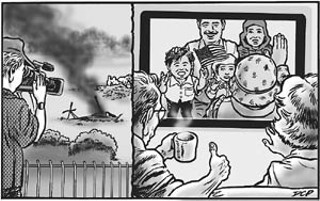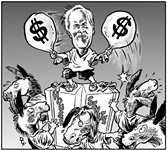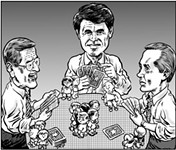A Failure of Intelligence
In 'wartime,' the willingness to be deceived is all too common
By Michael King, Fri., Feb. 20, 2004

"You can't rely upon a madman," declared George W. Bush. "You can't rely upon him making rational decisions when it comes to war and peace." That may have been the most rational declaration of the Leader of the Free World last week, as he paid court to Super Newsman Tim Russert at the White House and shyly attempted to win back the departing graces of the American public, or at least that part of it that watches Sunday morning talk shows. Although Russert was deferential to the point of obsequiousness, Bush bumbled on WMDs, on the rationale for war, on the economy, on the Alabama National Guard, even, for God's sake, on Skull and Bones ("It's so secret we can't talk about it"), apparently presuming that all those non-Yalie proles out there will instinctively understand that S&B is just an especially expensive variety of dimwit fraternity.
The extent of Bush's failure to bring it off could be measured by reading the Bushian pundits who quickly followed him, desperately attempting damage control. The funniest of these was David Brooks, who, like his president, has based a career almost entirely upon ideologically driven fictions. Brooks followed the Leader with his own version of what the prez "might have said" if he only had "the facility for perfectly expressing his situation in conversation." Somehow I don't think Bush would have recognized the columnist's translations into Old High Thumbsuck, although to his credit Brooks was just as full of melodramatic nonsense as his original. "I wake up every morning," wrote Brooks-Bush, "and stare into the hole where civilization used to be."
Brooks, you idiot, that's the loo.
So where were we? Ah, yes, the "failure of intelligence." Bush had been forced to this humiliating exercise, momentarily bereft of script and handlers, because departing chief U.S. arms inspector David Kay, looking up from the Iraqi devastation he had very much helped prepare, shrugged and admitted, "There aren't any weapons of mass destruction." And there was Doonesbury, trying to help: "Oops. My bad. Sorry about all the dead people."
Bush was somewhat apologetic, of course, about the "best intelligence possible," but hey, everybody makes mistakes. And there is a technical term, of course, for this unprecedented but certainly understandable misrepresentation of the known facts in order to bully the U.S. public and (with considerably lesser success) the international community into an illegal and immoral war.
It's called "lying."
Down the Memory Hole
Russert, to his credit, was blunt with Bush on the history. "Mr. President," Russert recalled, "when you spoke to the country, you said, 'There is no doubt.' When Vice-President Cheney spoke to the country, he said, 'There is no doubt.' Secretary Powell, 'No doubt.' Secretary Rumsfeld, 'No doubt, we know where the weapons are.' You said, quote, 'The Iraqi regime is a threat of unique urgency. Saddam Hussein is a threat that we must deal with as quickly as possible.'"
All Bush could say was, in effect, "Well, what I meant was ..."
The trouble is, this is hardly revelation. In this space in September 2002, under the heading "Liars in Public Places" – as the drums for war beat steadily louder and Dick Cheney visited Texas veterans to insist that Iraq was about to manufacture nuclear weapons and that the U.S. has the right to attack any nation it chooses at any time it chooses – I wrote, "So when Bush, Cheney, and their ilk, and their media scribes, continue to repeat their justifications and 'evidence,' remember: These men are liars." Remarking on the palpable absurdity of Cheney's claims about Iraq, a country then already devastated by years of terrible war followed by brutal economic sanctions enforced by a decade of military siege, I noted that the destruction of the Iraqi war machine had been abundantly documented by international inspectors (until the Clinton administration yanked them out in 1998, preparing to attack) and that the White House's charges were no more than a flimsy and flagrantly dishonest pretext for the new Bush doctrine: "the absolute right and authority of the United States government to do whatever it pleases, whenever it pleases, to whomever it pleases."
I recall all this not to claim any particular virtue or prescience, indeed, quite the opposite. What was evident to one solitary writer in the Texas provinces, just from attentively reading the national and international press for the last 15 years, was information equally available to the Tim Russerts and Judith Millers of the world, and indeed to anyone else with sufficient interest to pursue the matter. Instead, even now, after more than a year of transparent falsehoods, fully 45% of the U.S. public professes to believe that our leaders are telling the truth about that utterly immoral and illegal invasion of Iraq.
As the poet said, "came home, home to a lie, /home to many deceits ... /and liars in public places."
Willful Ignorance
Where do we go from here? A few weeks after I wrote that column, we heard from the floor of the U.S. Senate: "Why is Saddam Hussein attempting to develop nuclear weapons when most nations don't even try? ... According to intelligence, Iraq has chemical and biological weapons. ... Iraq is developing unmanned aerial vehicles capable of delivering chemical and biological warfare agents."
And then the next day, on the same spot, "We know that he [Hussein] has chemical and biological weapons."
The first voice was that of the senator from Massachusetts, John Kerry. The second, the senator from North Carolina, John Edwards. They were certainly not alone, and indeed very few of their fellows in Congress were willing to stand up directly against the frenzy for war. Austin's Lloyd Doggett was one exception, Ohio's Dennis Kucinich another. If those elected officials (and a few dozen others) could see through the obvious lies, why couldn't John Kerry and John Edwards?
As Doggett said at the time, "My sense is that unless we take some risk and get out and speak out about it, we're in danger of becoming part of the problem instead of part of the solution."
Where were John Kerry and John Edwards when it mattered? ![]()
Got something to say on the subject? Send a letter to the editor.








